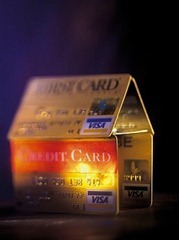 So you’re walking out of the bankruptcy court thinking to yourself, “What have I just done?” Not to fear! There is a light at the end of that tunnel. The light at the end of that tunnel is new-found HOPE and DISCIPLINE.
So you’re walking out of the bankruptcy court thinking to yourself, “What have I just done?” Not to fear! There is a light at the end of that tunnel. The light at the end of that tunnel is new-found HOPE and DISCIPLINE.
First Things First
Jump back into the credit game! You’re probably saying to yourself, “Well this is what brought me to bankruptcy court.” True, it is what brought you there. This time, you are going to actually be a player in the game and not get played by the game. You need to get a few credit cards. Typically three credit cards is a reasonable goal to work toward. You probably will not be approved for an unsecured credit card; you are going to want to focus your efforts on getting secured credit cards. These are where you put a deposit down in order to open the card. A good resource in getting these types of credit cards is RateCatcher.com/credit-cards. Click on the "category" down button and select "bad credit". You will then be presented with a list of credit cards and an explanation of each one. RateCatcher.com gathers offers from all the leading banks and make them available to you in one simple location. When you do look into any offer, make sure that the offer states that they report to the credit bureaus. You want to get noticed by the credit bureaus for your good new habits of paying your bills. This will add 30% to your newly growing credit score. As the credit cards you get age over time, this will add 15% to your growing score. A good credit score according to www.myfico.com is:
- 620-659 is fair
- 660-699 is good
- 700-759 is great
- 760-850 is excellent
Simply by getting into the habit of paying your bills on time every month will add 35% to your new credit score.
What About Car Loans?
Many car dealerships scream with advertising such as “Rebuild credit after bankruptcy.” This is a misleading statement. It is true that car credit is one way to rebuild credit; it’s just not a very effective way of doing it. The reason I stress credit cards so much is because it is the best way to rebuild credit. Revolving loans such as credit cards account for 30% of your credit score, installment loans (such as car loans) only account for 10% of your credit score. Not much “bang for your buck” there.
An Important Tip
Now that you are dutifully searching secured credit card offers, keep in the back of your mind that in order to maximize the impact of these cards on your credit report, you need to keep the balances at 30% or less of what the credit limit is. The closer your balance gets to the maximum credit limit, the worse it is for your credit score. This is known as the utilization ratio. It is entirely possible to kill your credit score just by maxing out your credit cards. As a personal anecdote, I had some cards that were maxed out, I paid them down to below 30% and I got almost a 100 point increase on my credit score! One other thing to keep in mind about credit cards, the available credit limit does not matter. You can get the same impact on your credit score with just a $250.00 credit card as you can with a $10,000 limit. It’s all about keeping the card paid down and paid on time.
Now that you know that the light at the end of that bankruptcy tunnel is NOT a train, but in fact, it’s NEW HOPE. I wish you luck on your new journey.
